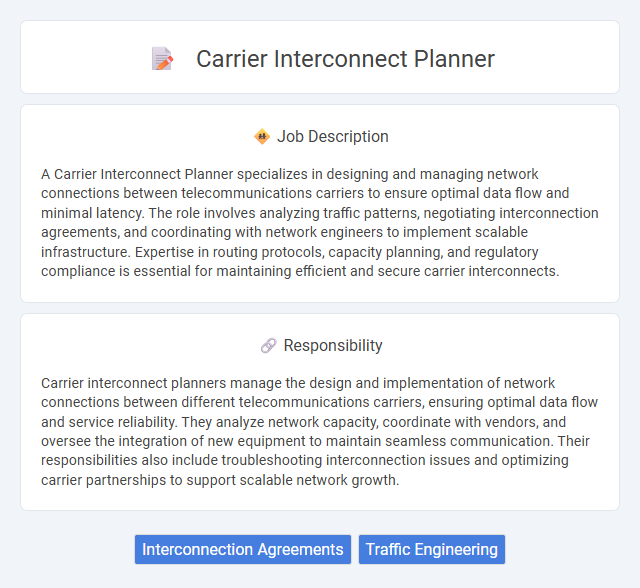
A Carrier Interconnect Planner specializes in designing and managing network connections between telecommunications carriers to ensure optimal data flow and minimal latency. The role involves analyzing traffic patterns, negotiating interconnection agreements, and coordinating with network engineers to implement scalable infrastructure. Expertise in routing protocols, capacity planning, and regulatory compliance is essential for maintaining efficient and secure carrier interconnects.
Individuals with strong analytical skills and attention to detail are likely to be well-suited for a Carrier Interconnect Planner role, as the job involves managing complex network connections and coordinating logistics. Those comfortable working in fast-paced environments and skilled at problem-solving may find the responsibilities challenging yet rewarding. Candidates who prefer collaborative tasks and can adapt to evolving technology trends probably have a higher chance of success in this position.
Qualification
A Carrier Interconnect Planner typically requires a bachelor's degree in telecommunications, computer science, or electrical engineering, combined with experience in network design and interconnect strategy. Proficiency in routing protocols, network architecture, and inter-carrier agreements is essential, alongside strong analytical and project management skills. Industry certifications such as Cisco CCNA or Juniper JNCIA enhance job qualifications and demonstrate technical expertise.
Responsibility
Carrier interconnect planners manage the design and implementation of network connections between different telecommunications carriers, ensuring optimal data flow and service reliability. They analyze network capacity, coordinate with vendors, and oversee the integration of new equipment to maintain seamless communication. Their responsibilities also include troubleshooting interconnection issues and optimizing carrier partnerships to support scalable network growth.
Benefit
Carrier interconnect planners likely offer significant benefits by optimizing network connections to improve communication efficiency and reduce operational costs. Enhanced planning may lead to increased network reliability and scalability, supporting future growth and technological advancements. Their expertise probably supports better vendor negotiations and compliance, contributing to overall organizational success.
Challenge
The role of a Carrier Interconnect Planner likely involves navigating complex network infrastructures and coordinating multiple service providers, presenting ongoing challenges in maintaining seamless connectivity. There is a probability that adapting to rapidly evolving technologies and regulatory requirements demands constant learning and strategic problem-solving. Managing inter-carrier agreements and troubleshooting potential bottlenecks could frequently require innovative planning and precise execution.
Career Advancement
Carrier Interconnect Planners specialize in designing and managing network connectivity between telecommunications providers, ensuring seamless data exchange and optimal performance. Mastery in network topology, traffic analysis, and regulatory compliance enhances opportunities for progression into senior planning, network architecture, or telecommunications project management roles. Expertise in emerging technologies and cross-carrier collaboration increasingly positions professionals for leadership roles within telecom operations and strategic infrastructure development.
Key Terms
Interconnection Agreements
Carrier Interconnect Planner specializes in managing and optimizing Interconnection Agreements to ensure seamless network connectivity between telecommunications operators. This role involves negotiating terms, analyzing traffic patterns, and coordinating technical specifications to maintain reliable and cost-effective data exchange. Expertise in regulatory compliance and industry standards is essential for sustaining effective carrier partnerships and maximizing network performance.
Traffic Engineering
Carrier Interconnect Planners specializing in Traffic Engineering design and optimize network routes to ensure efficient data flow across interconnected carrier networks. They analyze traffic patterns, capacity requirements, and latency factors to develop scalable interconnection solutions that minimize congestion and maximize bandwidth utilization. Their expertise in MPLS, SDN, and routing protocols enables seamless integration and high-performance network interconnectivity essential for carrier-grade service delivery.
 kuljobs.com
kuljobs.com